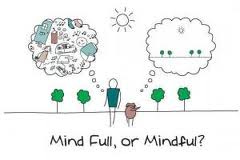‘This is about looking at the mind as though we are looking in a mirror. Just observing what goes on, but not trying to change anything. We have to look in a dispassionate way, and ask ourselves, ‘How is the mind at the moment?’, is it full of clinging desire, anger or aversion, unawareness, is it present in the moment or distracted?’ We should look at the mind in this way, do not pass any judgement, just look at what is going on, as though we were observing something outside of us.

Do not see the mind as ‘your’ mind. Look upon it as something that is present, but with no self attached to it. This is not an intellectual exercise, and you are not required to form any ideas or opinions. It is just a simple process of discovery.
By observing the mind and seeing the thoughts, feelings and emotions come and go, we can see how they just appear and are quickly gone again. We start to observe patterns and see how one type of thought follows another. We become better at knowing ourselves and understanding what is driving us.
If you observe hateful, sad, unpleasant thoughts, don’t ignore them, struggle against them or try to repress them. Just observe them. Don’t get frightened, worried or try chasing them off. Stay focused, observe what arises and let them go.
What we are trying to do is recognise every thought as it arises. So if a happy thought arises, we just recognise it as a happy thought. If an unhelpful thought arises, we recognise it as an unhelpful thought. Don’t let any thought arise without recognising it, and don’t try to change or fix it. Be completely non-judgemental and let the thought go. We have a tendency to try and change the world, but with this practice we learn to cultivate the ability to be relaxed with what is going on. By letting go, the mind becomes free and we gain a sense of peace.
This way of observing our thoughts isn’t just something we do for an hour a day on the meditation cushion. We have to take it into our day to day lives. If a helpful thought arises, act on it, if an unhelpful thought arises, let it go. This way we are not going to indulge in harmful acts, only kind and helpful ones.
We rarely stop and spend time on observing our minds. We just let thoughts, hopes, fears and dreams come and go unchecked. We don’t think twice about devoting a lot of time and effort to our bodies, clothes, belongings, family and friends, but just leave the mind uncared for. So it is time to start caring for the mind, as it is the one thing that can bring about a great change in our lives.
In the Adanta Sutra, Gautama Buddha stated this about the mind:
‘I know not of any other single thing that brings such woe as the mind that is uncultivated, uncontrolled, unguarded and unrestrained. Such a mind indeed brings great woe.’
‘I know not of any other single thing that brings such bliss as the mind that is cultivated, controlled, guarded and restrained. Such a mind indeed brings great bliss.’
You can read more blogs, listen to podcasts, watch videos and practice guided meditations on the Buddhism Guide app. Available from the Apple Store and Google Play.
If you would like to become a supporter of Buddhism Guides work, such as podcasts, blogs, videos and guided meditation practices, please visit here. You can support for as little as $2 a month.


